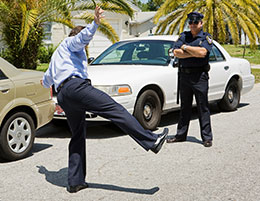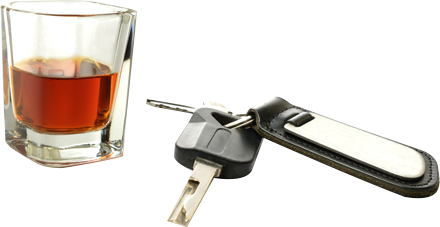The Police Stop You
For Driving While Intoxicated
What Should You Do?
Stopped For DWI?
What Should You Do?
NYC DWI Charges?
Our Lawyers Help
Recover Your Car…
Save Your License!
 Field sobriety tests (FSTs) are standardized procedures used by police officers to assess a driver’s level of impairment, particularly when alcohol or drugs are suspected. These tests are typically administered during a DWI stop and serve as a way for officers to gather evidence of impairment – evidence that can be used to prosecute your case in court.
Field sobriety tests (FSTs) are standardized procedures used by police officers to assess a driver’s level of impairment, particularly when alcohol or drugs are suspected. These tests are typically administered during a DWI stop and serve as a way for officers to gather evidence of impairment – evidence that can be used to prosecute your case in court.
Field sobriety tests provide a way to evaluate motor skills, coordination, balance, and cognitive functions, which may be affected by alcohol or drug use. Drivers are NOT required to perform these tests. Our firm recommends that you only agree to take a field sobriety test if you are confident that you will pass.
Types of Field Sobriety Tests
There are numerous field sobriety tests, but the three most common tests are:
- Horizontal Gaze Nystagmus Test
- Walk-and-Turn Test
- One-Leg Stand Test
Horizontal Gaze Nystagmus (HGN) Test
The officer asks the driver to follow an object (usually a pen or flashlight) with their eyes. The officer is specifically looking for signs of nystagmus, an involuntary jerking or twitching of the eyes that becomes more noticeable when a person is intoxicated or impaired.
In this test, the officer will move the object horizontally from left to right and monitor the driver’s eyes for three specific indicators:
- Lack of smooth pursuit: The driver’s eyes should move smoothly when tracking the object. If your eyes either jerk or twitch while following the object, it could indicate impairment.
- Distinct and sustained nystagmus at maximum deviation: This is when the eyes are turned as far to one side as they can go, and the officer observes if the eye jerking becomes more pronounced.
- Onset of nystagmus prior to 45 degrees: This is the point when the eyes begin to jerk as the object is moved to a certain angle, typically at 45 degrees from the center.
The HGN test is considered the most accurate field sobriety test to detect intoxication. While studies show a high level of correlation between nystagmus and DWI, the administration of the test itself can cause a biased outcome.
Walk-and-Turn Test
The Walk-and-Turn evaluates a driver’s ability to balance and perform multiple tasks at the same time, which are skills that alcohol impairs. This test involves the following steps:
- The officer instructs the driver to stand heel-to-toe on a straight line.
- The driver then takes nine steps, walking along the line, then turn around on ONE foot, and walk back the same way, taking another nine steps.
The officer looks for the following clues of impairment:
- Inability to balance while listening to instructions
- Starting too soon – before the officer finishes explaining the test
- Not walking heel-to-toe as instructed
- Stepping off the line, or using your arms for balance
- Failure to turn correctly, such as turning with two feet on the ground instead of pivoting on one foot
- Incorrect number of steps
Any of these signs may suggest that the driver’s motor coordination has been compromised, possibly due to intoxication. Naturally, only an aggressive DWI lawyer knows how to challenge the officer’s testimony on the witness stand during a trial.
New York’s top DWI attorney knows how to challenge these tests in court. Typically the road surface is not flat, but slanted or tilted and even sober people may fail. Some people suffer from medical conditions that affect their ability to perform these acrobatic exercises even when not intoxicated.
One-Leg Stand Test
The One-Leg Stand test is a divided attention test, assessing a driver’s ability to balance on one leg while also listening to and following instructions (multitasking). The driver is asked to raise one leg approximately six inches off the ground and hold that position while counting aloud until asked to put the leg down.
The officer observes for signs of intoxication that include:
- Swaying while attempting to balance
- Using arms to maintain balance
- Hopping or shifting from one leg to the other
- Putting the foot down before the officer’s instructions
- Not being able to maintain the position for the required amount of time (usually around 30 seconds)
Like the Walk-and-Turn test, this field sobriety test evaluates the driver’s balance and ability to multitask under pressure. Alcohol and drugs, particularly central nervous system depressants, can affect the motor coordination skills needed to successfully perform the One-Leg Stand test. Clearly women in high heels will have extreme difficultly performing this test, even when sober.
Standardization of Field Sobriety Tests
While all three field sobriety tests must be conducted, the National Highway Traffic Safety Administration (NHTSA) has established standardized protocols for the HGN, Walk-and-Turn, and One-Leg Stand tests. These protocols are designed to ensure that the tests are fair (they are NOT fair), and they help the police gather evidence to prosecute your DWI case.
Importance of Field Sobriety Tests
Field sobriety tests are one tool law enforcement officers use in DWI cases. They serve as a means to assess a driver’s intoxication without the need for more invasive methods, such as blood or breath tests. Additionally, FSTs help officers build a case of probable cause for an arrest, if they believe the driver is intoxicated.
Field sobriety tests are not infallible. Numerous factors will affect a person’s performance, such as medical conditions, physical disabilities, or age. Even drivers who are not impaired can sometimes fail one or more of these tests. Therefore, while FSTs are given, they are typically used in conjunction with other evidence, such as breathalyzer results or blood tests, to prove DWI.
If your case reaches trial, a DWI lawyer will challenge field sobriety tests to question their reliability and accuracy. Common legal challenges include:
- Improper Administration: Your DWI lawyer can argue that the officer did not follow standardized procedures for conducting the tests, which invalidates the results. For example, the officer might not have explained the test properly, which will impact the outcome.
- Physical or Medical Conditions: Certain physical conditions, such as balance problems, injuries, or neurological disorders, affect a person’s ability to perform field sobriety tests. An attorney can present medical records or expert testimony to show that the defendant’s inability to complete the tests is due to a condition unrelated to intoxication.
- Environmental Factors: Conditions like poor weather, uneven surfaces, or inadequate lighting all interfere with your ability to perform well on field sobriety tests. Your NYC DWI attorney will argue that these factors create an unfair testing environment for the driver.
- Subjectivity of the Tests: Many FSTs are based on subjective observations. A DWI lawyer will challenge the officer’s interpretation of the driver’s performance, arguing that signs of impairment were misinterpreted.
- Failure to Administer All Tests: In some cases, if all three standardized FSTs were not administered, your DWI lawyer will argue that the evidence was incomplete and not reliable.
 NYC DWI Attorney – Your Key To A Strong DWI Defense
NYC DWI Attorney – Your Key To A Strong DWI Defense
Your lawyer’s strategies will cast doubt on the accuracy of the field sobriety tests and weaken the prosecution’s case against you. Contact New York’s top DWI Attorney for a consultation today, call 917-519-8417 to fight DWI charges and defend your rights.
Read Our Clients’ Testimonials
-
Martin B.
Excellent Attorney
Michael is an excellent Attorney. He was able to get my case dismissed. He listened to what I had for say and applied it to my defense.Read more -
Robert Z.
Absolute Top-Notch Criminal Defense Lawyer
This review comes from someone with a law degree from NYC. I landed on Michael after a thorough review online of his background and DWI experience. It's hard to think where my life and career would be right now if I entrusted my case (which involved an aggressive NYPD traffic stop leading to a DWI charge) to any other lawyer I considered. Michael displayed the perfect combination of factors: he aggressively defended me, respectfully contested any and all prosecutorial overstepping, understood exactly how/where their case was weak, and all the while kept me at ease in an otherwise stressful situation. And that was no easy task - my case kept getting adjourned because the prosecution was never ready. And while I wasn't thrilled that the court kept making me appear (over a year and half - one of the longest cases on the docket), Michael was there for me every step of the way. What did all that amount to? A DWI charge reduced to community service - no probation, no suspension, no major disruption to my life. While you must keep in mind that every case is different, one sure guarantee is that if Michael takes your case, he WILL defend you to the fullest. By the end, I considered Michael a friend as much as a lawyer.
Read more -
Maggie C.
“I chose to go to law school because I thought that someday, somehow I’d make a difference”, a quote by Christopher Darden
When I read this I immediately thought of Michael and my experience with him. I didn’t know Michael prior to needing legal advice and representation. I did exactly what you are doing now, reading the reviews attorneys received from their client in determining if this was the right choice for my situation. Once meeting and consulting with Michael about my legal situation, (potential DWI) I knew he was the right lawyer to represent me. At the end of 10 months of going through the process of court dates and hearing, he came through, even when I started to think the outcome would not result in my favor. Before trail he met with the DA, and did make a BIG difference, reducing a potential DWI misdemeanor conviction to a traffic violation. My advice to you, choose Michael, listen to his counsel, go through the process and don’t lose faith because his goal is to “make a difference” on your behalf. Thanks again Michael!
Read more -
Noel R.
Michael was always honest which is key, professional and most importantly he got the job done. My case was won and I couldn't be happier. I would definitely suggest him.
Read more -
Anonymous
Great Lawyer
Mike helped me out with a DUI case i was involved with. He was informative and extremely good his job. Facing some serious charges he was able to help me with being charged for an infraction. The fine was reduced and i will have to take a class. Unfortunately, my license will be suspended but he was able to get a stay for 20 days so i can work and figure out what i will have to do for the future running my business. I highly recommend Mr. Discioarro.
Read more -
Richard H.
Excellent Lawyer | DWI Case
Michael is truly the best at what he does. Great guy, very down to earth, straight forward and upfront. He makes the most stressful situations feel very light. After some research online, i found him and read some reviews that prompted me to set up a meeting resulting in me hiring him. After my dwi, my car was impounded. He helped me get it back very quickly and was in contact with me every step of the way. He reponded to any questions, messages, or phone calls in a timely fashion. After many court dates, my case eventually got dismissed thanks his dedication and hard work. I would highly recommend him.
Read more -
Jerry C.
Great Guy, Greater Lawyer
Michael is a great man and more specifically a great lawyer, after being arrested for a DWI in New York, I thought I was done for and I would have to spend time in jail. Michael helped me through the entire process, showing me what I needed to do to beat the case as best as possible. He was upfront and honest with me and told me what will happen and how things were to turn out. I did what I had to do, going through an alcohol program, fixing my driver's license and showing up for ever court appearance. After numerous court appearances, the case was dropped down to a traffic infraction. I felt relieved and happy to know that I only had to pay a $300 fine. I've kept in contact with Mike ever since and even referring him to others that got caught up one night. Thanks again Michael
Read more





